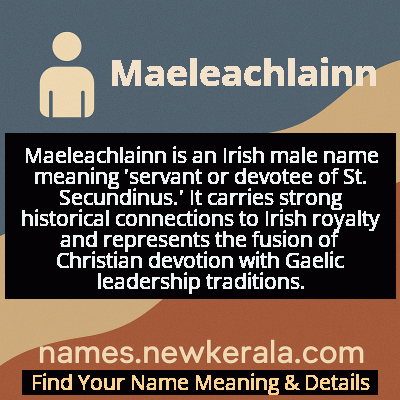Maeleachlainn Name Meaning & Details
Origin, Popularity, Numerology Analysis & Name Meaning of Maeleachlainn
Discover the origin, meaning, and cultural significance of the name MAELEACHLAINN. Delve into its historical roots and explore the lasting impact it has had on communities and traditions.
Name
Maeleachlainn
Gender
Male
Origin
Irish
Lucky Number
8
Meaning of the Name - Maeleachlainn
Maeleachlainn is an Irish male name meaning 'servant or devotee of St. Secundinus.' It carries strong historical connections to Irish royalty and represents the fusion of Christian devotion with Gaelic leadership traditions.
Maeleachlainn - Complete Numerology Analysis
Your Numerology Number
Based on Pythagorean Numerology System
Ruling Planet
Saturn
Positive Nature
Ambitious, efficient, realistic, and authoritative.
Negative Traits
Materialistic, stressed, confrontational, and can be overly ambitious.
Lucky Colours
Dark blue, black.
Lucky Days
Saturday.
Lucky Stones
Blue sapphire, amethyst.
Harmony Numbers
2, 4, 6.
Best Suited Professions
Business leaders, managers, financial services, law enforcement.
What People Like About You
Leadership, determination, organizational skills.
Famous People Named Maeleachlainn
Máel Sechnaill mac Máele Ruanaid
High King of Ireland
First historical High King of Ireland from the Southern Uí Néill dynasty
Máel Sechnaill mac Domnaill
High King of Ireland
Last High King of Ireland from the Southern Uí Néill, contemporary of Brian Boru
Máel Sechnaill Ó Cearbhaill
Gaelic Lord
Prominent 16th century Irish lord and patron of Gaelic culture
Name Variations & International Equivalents
Click on blue names to explore their detailed meanings. Gray names with will be available soon.
Cultural & Historical Significance
The name's continued use through the centuries, even during periods of English domination, represents cultural resilience and the preservation of Irish identity. In modern times, it serves as a living connection to Ireland's royal past and the complex social structures of Gaelic society. The variations of the name across different historical periods reflect the evolving nature of Irish language and culture while maintaining continuity with ancient traditions. For contemporary bearers, the name carries the weight of centuries of Irish history and the enduring legacy of Gaelic civilization.
Extended Personality Analysis
Individuals named Maeleachlainn are typically associated with strong leadership qualities tempered by a deep sense of tradition and responsibility. They often possess natural authority that comes from confidence and competence rather than aggression or dominance. There's a contemplative quality to their nature, with many demonstrating thoughtful decision-making and strategic thinking that considers long-term consequences. Their connection to such a historically significant name often instills a sense of legacy and cultural awareness, making them conscious of their place in broader social and historical contexts.
In interpersonal relationships, Maeleachlainns are often loyal and dependable, serving as pillars for their families and communities. They tend to value wisdom and experience, showing respect for elders and tradition while being capable of adapting to modern circumstances. Many with this name demonstrate a balance between innovation and conservation, understanding when to preserve traditions and when to embrace change. Their service-oriented nature, reflected in the name's meaning, often manifests as dedication to community welfare and a sense of stewardship rather than subservience. They typically approach challenges with patience and persistence, drawing strength from their cultural heritage and personal convictions.
Modern Usage & Popularity
In contemporary usage, Maeleachlainn and its variations occupy a unique space as historically significant but relatively uncommon names. The anglicized form 'Malachy' sees more frequent use internationally, particularly in countries with Irish diaspora communities, while the original Gaelic forms are primarily found in Ireland itself. There has been a modest revival of traditional Gaelic names in recent decades, with Maeleachlainn occasionally appearing in birth registrations, especially in areas with strong Gaeltacht connections or among families actively preserving Irish cultural heritage. The name is considered distinctive and carries substantial historical weight without being overly common, making it appealing to parents seeking a name with deep cultural roots and royal associations. Its usage trends reflect broader patterns in Irish naming, where traditional names cycle in and out of fashion while maintaining their cultural significance.
Symbolic & Spiritual Meanings
Maeleachlainn carries rich symbolic meanings that extend beyond its literal translation. The name symbolizes the ideal balance between spiritual devotion and temporal leadership that characterized medieval Gaelic society. It represents service not as subservience but as dedicated stewardship - the concept of a leader who serves both divine purpose and community needs. The name embodies continuity and tradition, serving as a living link between modern Ireland and its ancient royal heritage. Symbolically, it also represents cultural resilience, having survived centuries of political change and cultural suppression to remain relevant in contemporary Ireland. The name's connection to multiple High Kings gives it connotations of authority, wisdom, and the responsibility that comes with leadership, while its religious elements symbolize the integration of faith with daily life and governance.

